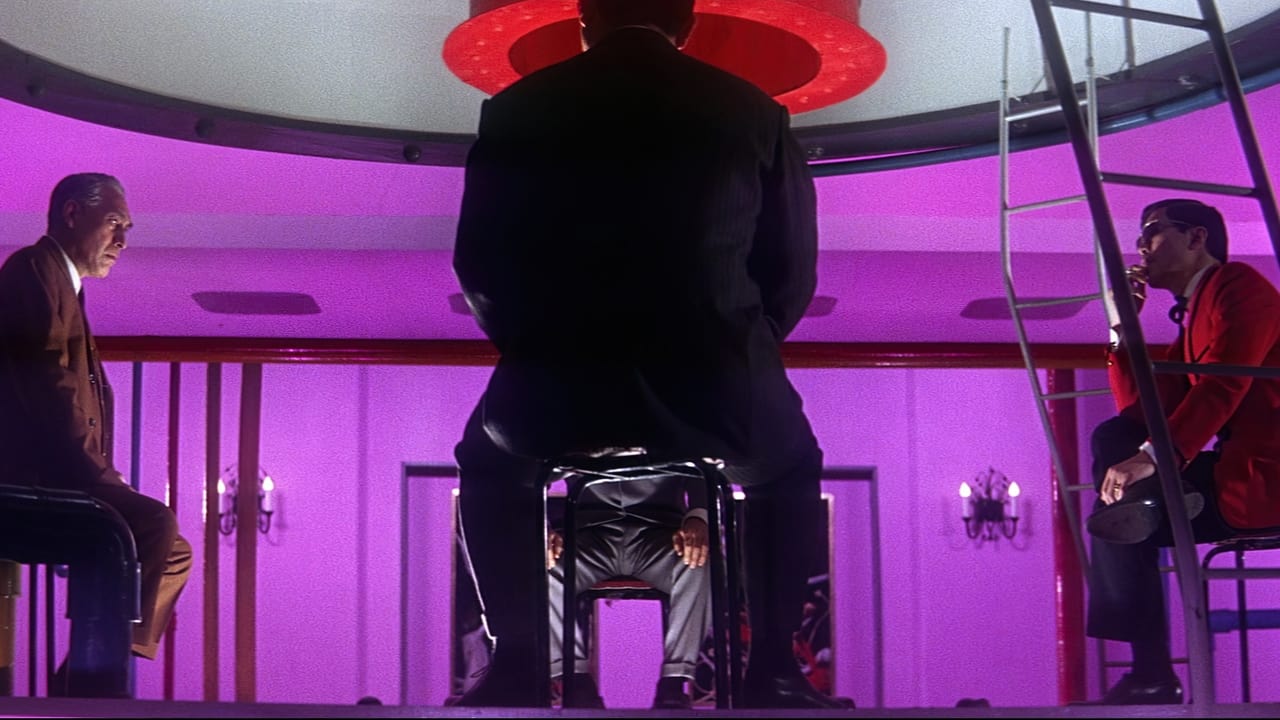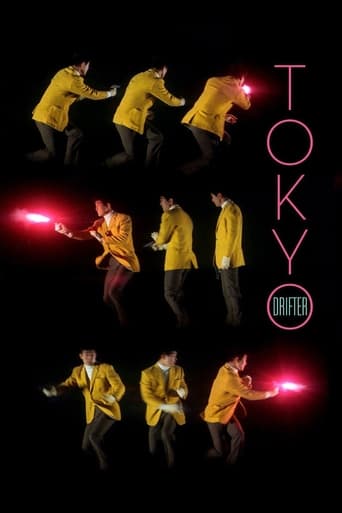



One of the best movies of the year! Incredible from the beginning to the end.
View MoreThis is a small, humorous movie in some ways, but it has a huge heart. What a nice experience.
View MoreThere is, somehow, an interesting story here, as well as some good acting. There are also some good scenes
View MoreThe thing I enjoyed most about the film is the fact that it doesn't shy away from being a super-sized-cliche;
View MoreTOKYO DRIFTER / THE MAN FROM TOKYO / TOKYO WANDERER (LIT.) (TOUKYOU NAGAREMONO). Viewed on Streaming. Cinematography = four (4) stars; choreography = four (4) stars; continuity/editing = three (3) stars; score = three (3) stars; sound effects = two (2) stars. Director Seijun Suzuki once again demonstrates how to make a movie sufficiently absurd and plot less to practically guarantee its immortality as a late-night cult favorite--eventually. Suzuki seems to be simultaneously milking/exploiting Yakuza movie cultural fiction (as source material) while satirizing typical/conventional contemporary Yakuza films. The movie is a low-level programmer (even by Nikkatsu studio's usual cheap production standards) and seems to have contributed to (1) the Director's firing by Nikkatsu shortly thereafter, and (2) hastening the liquidation of the studio's assets except for its pink film (soft-core pornography) department. Acting (such as it is) appears to be deliberately exaggerated/amateurish. Cinematography (wide screen, color) can be shaky (due to inadequate camera stabilization); opening black/white scenes are over exposed (on purpose?). Excessively choppy and jump-cut editing pretty much destroys continuity throughout the film (to enhance viewer confusion?). Sound effects are ludicrous (squealing tires on gravel roads; all punches sound the same; the sound of gun shots and ricocheting bullets never changes; dialog looping is obviously artificial; etc.). Choreography of fight scenes appears woefully under rehearsed (especially the ones in the snow (on Hokkaido?)). Score combines some jazz riffs with generic rock and roll, but primary the music consists of an unimaginative/monotonous theme song repeated over and over (and over) again. Restoration is fine. Subtitles are adequate (most song lyrics and signs are translated and white text on white backgrounds can be easily read, since words are framed in black). Something to possibly look at, never to think much about. WILLIAM FLANIGAN, PhD.
View More"Tokyo Drifter" (1966) Dir: Seijun SuzukiLured by Criterion's promise of an ultra-cool "free-jazz Gangster film", I sat down to watch "Tokyo Drifter" a couple of days ago and when it was done I had to resist the temptation to watch it again, or at least flick through it. This used to happen a lot when I watched films as a kid - I'd pick something weird and deliberately over my head, barely comprehend what was going on at all, and spend the next few days rewinding the tape to rewatch the best parts. I had no idea whether to like these films or not, and after my first viewing of "Tokyo Drifter" I feel the same. The only difference is, I'm old enough now to realise that this is not necessarily a good thing.The plot is a pretty linear Yakuza tale. The boss goes straight and decides to buy a building complex in the heart of Tokyo, but a rival gang wrestles the property deal out of their hands. Some violence and a little blackmail later, the ex-gangster Tetsu is forced to leave the big city to keep the heat off his reformed boss. But it's too late - he's made enemies and they're not going to let him just walk away. He is pursued into the county, and a few more fight scenes ensue before he inevitably returns to Tokyo to put things right.But who are we kidding, we're not really here for the storytelling. The strident and forceful use of colour, whip-crack editing and self-conscious 1960s imagery has been widely praised, and widely drawn upon for inspiration. Tarantino is the most well-known of this film's direct or indirect followers, and since the 1990s this kind of overtly cool and stylish/stylised film-making has become a staple of our cinema-going experience, for better or worse. The truth is, "Tokyo Drifter" is glossy and shallow, with no real attention paid to the actual characters. It's also wilfully unexplainable, which is not automatically a bad thing but I did find it difficult to excuse in this context. It's obvious that Suzuki is not shooting for character depth or realism, so what does he want to do with this film?Firstly, he wants to do music. The Westernised theme tune is used plenty of times throughout: whistled and mimed by the main character, soundtracking a montage of neon lights, wistfully delivered by Tetsu's nightclub-singing non-character of a girlfriend, and several more. The wonderfully gaudy dance hall owned by the rival Yakuza is constantly playing the exact same rock 'n' roll tune. Secondly, Suzuki wants to find the line between 'clicheed' and 'timelessly cool' and stamp all over it. The enemy boss always wears black sunglasses, and is the object of many hilariously over-stylised zoom shots. Tetsu is capable of dodging intense close range fire by doing well-timed forward rolls into an open area. He is also completely unfazed by barrages of punches to the face and overhead chair-smashings. It all starts to get rather fun after a while, as one inexplicable situation leads into another. I think that's why people like this film - it's a mess of charming logical oversights, and it exists for its visual impact and surreality alone. The final shootout takes place in a very large, almost bare room that keeps changing colour. Tetsu hides behind randomly placed Roman pillars that are far too thin to effectively use as cover. As such, the best parts in "Tokyo Drifter" come when it acknowledges its own preposterousness and runs with it.I probably will watch this again, just like those other films I saw when I was a kid. The bizarre editing makes the already thin plot quite difficult to follow, but that will alleviate on further viewings. I still can't call this film a success because it provokes more laughter in me than it does awe, or excitement. It's undeniably unique and it certainly is pretty cool, though, which ultimately works in its favour. Despite this, it comes across more as a curio than anything else.
View MoreLimited from the 'company' Suzuki shines with his rebellious attack of these tired gangster genre movies with some flare and imagination.His use of color really highlights his true meaning throughout but especially in the final scene.We're looking further than the acting,cinematography and music in this movie and finding a true legend in Seijun Suzuki.P.S. This is my very first ever comment on IMDb and I'm told I need to have an additional amount of lines to sum up this very fine movie.What can I further say?In my opinion it's best to keep it half short,twice strong.So,to sum up-DO WATCH THIS MOVIE.DO SOME RESEARCH ON THIS LEGENDARY DIRECTOR-ENJOY!!!
View MoreSensible logic might be little, but director Suzuki Seijun's surrealistic pop-art gangster feature "Tokyo Drifter" is a tour-de-fore in flamboyant, and unusual film-making. Everything about this fashionably unhinged effort reeks of ultra-coolness, with its edgy but trendy stylish guidance painting an influential pathway for many film-makers to experiment, but also providing familiar staples of noir and western inspirations to its own brash, creative juices. I admit the busily dry story is quite an unbalanced muddle, with fractured editing, but still for that time glamorously unconventional and erratically bewildering. The focus of the material is that of devotion (of business and love), but some quirky sight gags and mayhem make there way in. Mainly it's all about the majestic set-pieces though, and the delirious appeal of them are a wondrously enchanting sight. A trippy colour scheme infuses itself on the psychedelically warped set-designs of moody composition lighting, and the sudden bursts of exaggerated violence have a poetically tough awe surrounding it. The taut pace of the film stays pretty much on cruise control, but where the energy feeds off can be linked to Kaburagi So's fierily dramatic jazz musical score, and Mine Shigeyoshi's intimately snappy cinematography positioning. Even breaking up the murky narrative are odd song choices and a rhythmic theme. The colourful performances are dashing, and life-like with a brooding array of interesting characters. Testsuya Watari, HidekaI Nitani, Ryuji Kita, Chieko Matsubara and Eiji Go are enjoyably tailored to their parts. Highly stylised fun.
View More